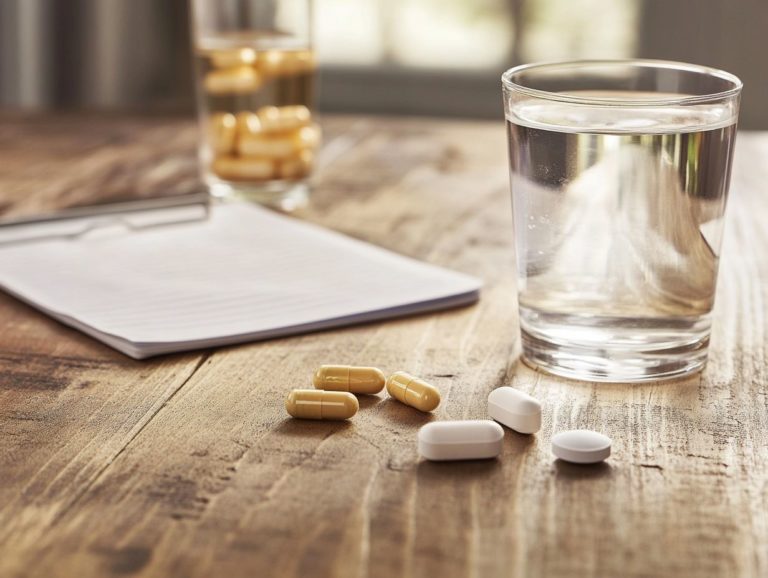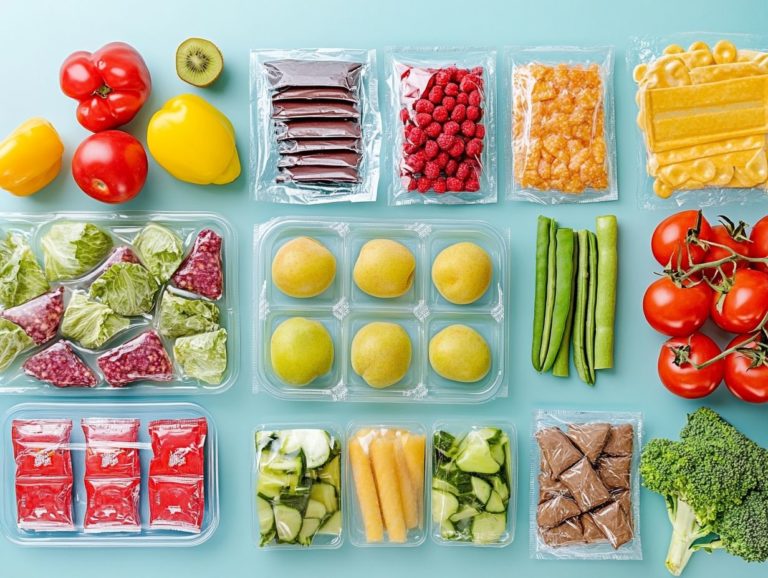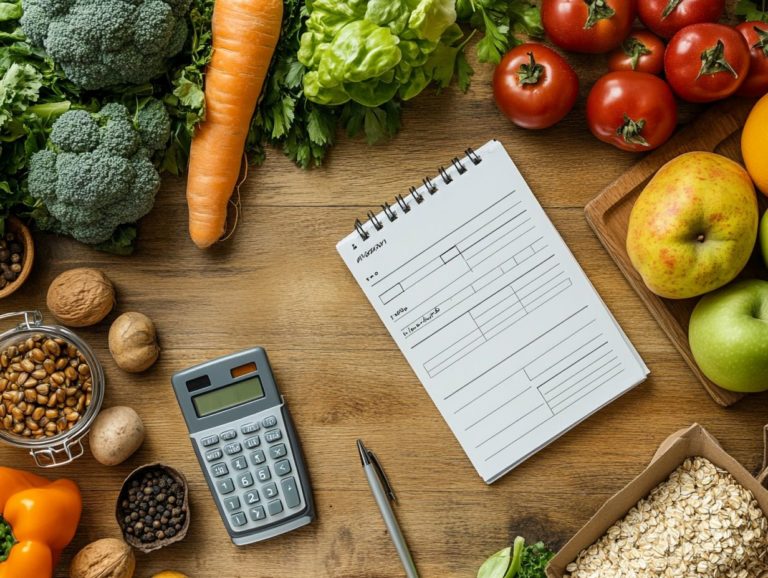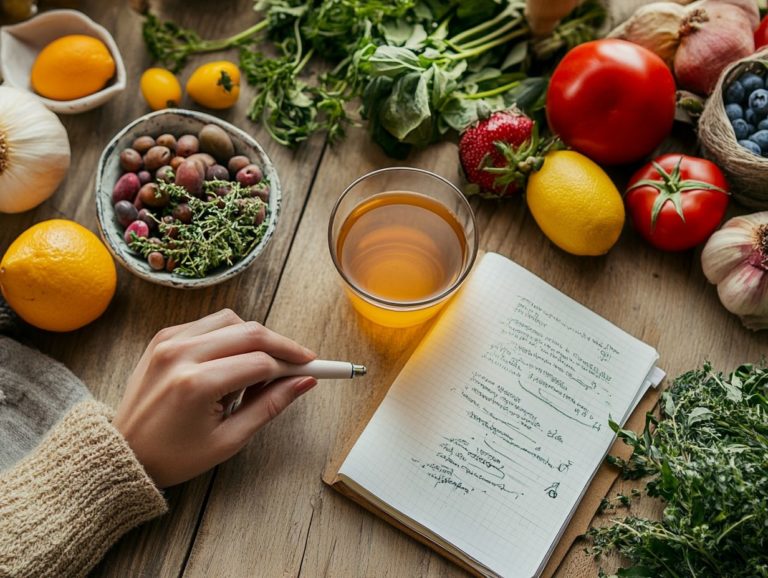How to Choose Healthy Beverages?
In a world brimming with beverage choices, understanding what defines a healthy drink is vital for your well-being.
This article explores the essence and importance of healthy drinks, highlighting the nutritional elements that influence your decisions.
By examining added sugars and understanding portion sizes, you’ll be equipped to make informed choices.
Discover a variety of healthy drink options and practical tips for navigating different settings whether you’re at home, in the office, or dining out.
Get ready to elevate your hydration habits and enhance your health!
Contents
Key Takeaways:
- Choose drinks with low sugar and natural ingredients to lower health risks.
- Be mindful of portion sizes to maintain a healthy balance of nutrients.
- In various situations, pick water, unsweetened drinks, low-sugar fruit juices, tea, or coffee for healthier choices.
Understanding Healthy Beverages
Understanding healthy beverages is essential today, where sugary drinks and flavored options often dominate the market, overshadowing informed choices.
Choosing healthy drinks like water, unsweetened tea, and natural fruit juices can significantly improve your hydration and nutrition.
By checking nutrition labels and being aware of sugar content, you can make choices that align with the American Heart Association s guidelines and enhance community health.
Factors to Consider when Choosing Beverages
When selecting drinks, consider factors like nutritional content, added sugars, and portion sizes. These can greatly affect your health.
By understanding the calorie content and spotting artificial ingredients, you can make choices that positively influence your drinking habits. This awareness helps prevent weight gain and reduces health risks linked to poor beverage selections.
Nutritional Content
The nutritional content of beverages is crucial for understanding their role in your diet. Choosing drinks rich in essential nutrients promotes better hydration and overall health.
Low-calorie beverages, water, and unsweetened drinks can satisfy your hydration needs without unnecessary calories. Consider a variety of drinks like:
- Green tea, high in antioxidants that protect your cells.
- Infused water, which not only quenches your thirst but also adds vitamins and minerals from fruits and herbs.
- Low-fat milk, offering essential calcium and vitamin D for bone health.
By understanding these options, you can stay hydrated while achieving a balanced intake of vital nutrients, paving the way for a healthier lifestyle.
Added Sugars and Artificial Ingredients
Added sugars and artificial ingredients hide in many drinks, especially sugary and energy drinks, posing significant health risks when consumed in excess. Moderation is key; overindulgence can lead to weight gain, heart issues, and pre-diabetes.
Regularly choosing sweetened options can lead to cravings, making it easy to pick sugary drinks over water and healthier alternatives.
Being aware of hidden sugars is crucial, so take the time to read nutrition labels. By opting for naturally flavored waters, herbal teas, or homemade juices, you can cut down on sugar intake while enjoying tasty hydration.
This smart choice boosts your health and sets you up for a vibrant lifestyle!
Make the switch today for a healthier tomorrow!
Portion Sizes and Serving Recommendations
Portion sizes and serving recommendations greatly influence your beverage choices, shaping your overall calorie savings and hydration levels. Understanding the right serving sizes for drinks like fruit juice, coffee, and flavored water can help you avoid consuming too many calories and develop healthy drinking habits.
- A typical serving of fruit juice is about 4 to 6 ounces. This helps keep your sugar levels in check while delivering essential vitamins.
- When it comes to coffee, moderation is vital. An 8-ounce cup is usually enough to enjoy sufficient caffeine without jitters or cravings for high-calorie creamers.
- Flavored waters can be refreshing, but limit them to 12 ounces per serving, especially if they contain added sugars or sweeteners.
Sticking to these recommended serving sizes helps you manage the calories you consume, contributing to a balanced diet and supporting your weight management goals.
Healthy Beverage Options
Exploring healthy beverage options is crucial for maintaining a balanced diet and staying adequately hydrated.
When you choose drinks like water, unsweetened tea, coffee, and low-sugar natural fruit juices, you re quenching your thirst while nourishing your body with essential nutrients. This helps you avoid high-calorie sugary drinks that can derail your health goals.
Water and Unsweetened Beverages
Water is the ultimate hydration solution calorie-free and vital for your health. Unsweetened beverages like herbal teas and flavored water offer delightful variety without the burden of added sugars.
Make water your go-to drink for hydration! You not only support your overall wellness but also help prevent unwanted weight gain.
Incorporating these options into your daily routine can significantly enhance your health journey. Infusing water with slices of citrus fruits or berries elevates the flavor and introduces a splash of vitamins.
Herbal teas, enjoyed hot or cold, provide numerous health benefits, from alleviating stress to aiding digestion.
Keep a reusable water bottle close and set reminders to sip throughout the day. This way, you can effortlessly stay hydrated.
Embracing unsweetened beverages as alternatives to sugary drinks paves the way for healthier habits, promoting vitality and a balanced lifestyle.
Low-Sugar and Natural Fruit Juices
Low-sugar and natural fruit juices are excellent alternatives to sugary drinks, delivering health benefits without excessive added sugars or artificial sweeteners. Enjoying these options in moderation satisfies your cravings while nurturing your health and hydration needs.
Incorporating these beverages into your diet provides essential vitamins and minerals, like vitamin C and antioxidants. These play vital roles in boosting your immune function and enhancing skin health, especially during warmer months.
However, be mindful of portion sizes; even natural fruit juices can pack in calories quickly. Reading labels can uncover hidden sugars in drinks that seem healthy at first glance.
Choose low-sugar varieties, and blend juices with water or seltzer to savor delightful flavors without compromising your health goals.
Tea and Coffee
Tea and coffee are not just go-to beverages for a pick-me-up; they also serve as excellent hydration sources and come packed with health benefits like antioxidants and essential nutrients, including calcium and potassium.
Opting for unsweetened varieties amplifies these advantages while keeping your calorie intake in check. Both drinks are rich in polyphenols and flavonoids compounds celebrated for their anti-inflammatory properties. These work wonders for your health by fighting oxidative stress.
Consuming them in moderation lowers the risk of chronic diseases, supports cardiovascular health, and may sharpen brain function. However, overindulgence can lead to unwelcome side effects, such as anxiety or sleep disturbances.
Integrating these delightful beverages into a balanced diet ensures better hydration and promotes your overall well-being.
Making Healthy Beverage Choices in Different Situations
Making healthy beverage choices can vary significantly based on your environment whether you’re at home, at work, or dining out. Each setting demands mindful drinking habits that support your overall well-being.
By understanding how to select appropriate beverages in these contexts, you can effectively sidestep sugary options and prioritize proper hydration.
At Home
At home, making healthy beverage choices begins with incorporating a variety of healthy drinks into your meal planning. Hydration should be a priority throughout the day.
Stock up on water, unsweetened tea, and low-sugar juices to supercharge your drinking habits. To elevate your options, try homemade smoothies and water with added fruits or herbs for flavor. This way, you create flavorful alternatives without the added sugars often lurking in store-bought options.
Understanding your hydration needs is essential. Aim for adequate water intake tailored to your level of physical activity and climate. Prepare beverages in advance and use glass or stainless containers for storage to maintain hydration levels and resist sugary sodas or energy drinks.
Ultimately, making informed, healthy beverage choices at home helps cultivate better drinking habits that can transform your well-being.
At Work or School
In work or school settings, the environment can significantly shape your beverage choices. Access to healthy options supports hydration and focus.
Bring your own water bottle filled with calorie-free drinks to avoid sugary temptations in vending machines.
Incorporate a variety of infused waters or herbal teas to make hydration enjoyable. These options boost your fluid intake while providing unique flavors that enhance your drinking experience.
Prioritize preparation by planning and packing nutritious beverages. This proactive approach helps resist unhealthy sodas or energy drinks when the day gets hectic.
By creating an environment rich in wholesome choices, you can boost your overall well-being and maintain energy levels, leading to enhanced productivity and focus in both academic and professional endeavors.
While Dining Out
When dining out, making healthy beverage choices can be challenging, especially with sugary drinks and calorie-laden options dominating the menu.
Being mindful of your selections like choosing water or unsweetened tea can significantly lower health risks tied to excessive sugar intake.
To navigate beverage options effectively, familiarize yourself with nutrition labels whenever available. These labels provide valuable insights into sugar and calorie content, enabling you to make informed decisions.
If the menu doesn t provide detailed information, ask your server about ingredients and preparation methods; they can clarify which options might be healthier.
Request modifications like less syrup in a cocktail or swap soda for sparkling water to make healthier choices.
Remember, moderation is key. Even when indulging in a treat, maintaining a balanced approach allows you to savor dining experiences without excessive guilt.
Frequently Asked Questions
- What are some tips for choosing healthy beverages? Look for low-sugar, low-calorie options like water, unsweetened tea, or low-fat milk.
- How can I tell if a beverage is healthy? Check the nutrition label for minimal added sugar and beneficial nutrients.
- Are natural fruit juices a healthy beverage option? Limit juice consumption due to high sugar content. Whole fruits are often a better choice.
Can I still enjoy my favorite soda as a healthy beverage?
Many sodas are packed with sugar and calories. These make them an unhealthy choice, but some brands offer reduced-sugar or sugar-free options.
What should I look for when choosing a beverage for hydration?
For good hydration, water is your best bet. You can also opt for low-calorie drinks that help replenish electrolytes.
What are some healthy beverage options for children?
Water, low-fat milk, and limited amounts of 100% fruit juice are great choices for kids. It’s important to keep sugary drinks like soda and energy drinks to a minimum for their health.





